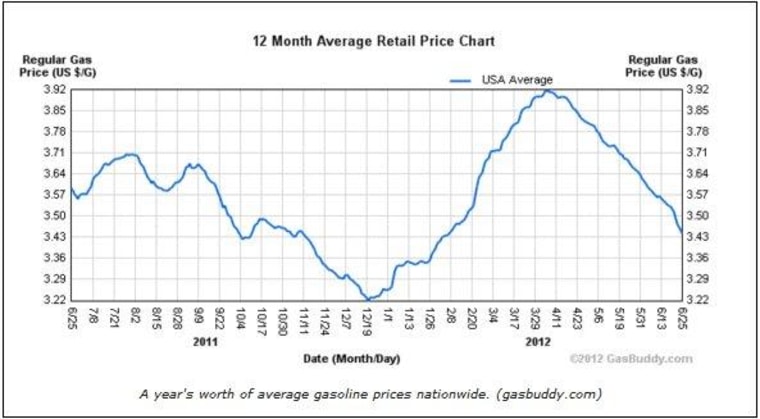Veteran Democratic pollster Peter Hart recently conducted a focus group in Colorado, and if President Obama's supporters want to feel depressed, they should certainly read what the undecided voters had to say.
One woman, a 49-year-old a customer service representative for an airline, said she'd consider voting for the president, but only if he "could do something huge, like really lower the price of gas."
Of course, the notion that Obama, by sheer force of will, can lower the price of gas is deeply foolish. The public's expectations about presidential power are often wildly at odds with reality; one official has limited control over the supply and demand of a globally-traded commodity.
On the other hand, gas prices really are dropping like a rock.
This chart, posted by Meteor Blades yesterday, shows gas prices over the last year. You'll notice that the cost per gallon has dropped about 50 cents since mid-April. What's more, with production up, oil inventories high, and global economic difficulties slowing demand, industry estimates suggest prices will drop to "$3 a gallon -- or less -- by autumn."
Obviously, conditions may change, but that's where things stand for now. Why should you care? There are two main angles to consider: the economics and the politics.
On the former, the drop in gas prices is welcome news for consumers, but the reasoning behind the drop is not at all encouraging -- crises in Europe and a weak domestic recovery are undermining demand, which in turn lower prices. Remember, after the crash in 2008, gas prices fell to about $1.80, but it wasn't good news in a macro sense.
That said, a drop in prices in the U.S. can put a little more money in consumers' pockets, which may have a modest stimulative effect.
But let's not overlook the politics, either. Republicans have argued, repeatedly and without shame, that when gas prices were on the rise, this was entirely President Obama's fault -- many leading GOP voices argued with a straight face that the president was single handedly pushing gas prices up in an election year, on purpose.
Indeed, Rebecca Leber pulled together some interesting quotes from the spring.
Mitt Romney, March 18, 2012: "He gets full credit or blame for what's happened in this economy, and what's happened to gasoline prices under his watch, and what's happened to our schools, and what's happened to our military forces. All these things are his responsibility while he's president."House Speaker John Boehner (R-OH), April 6, 2012: "The president holds the key to addressing the pain Ohioans are feeling at the gas pump and moving our nation away from its reliance on foreign energy. My question for the president is: what are you waiting for?"Boehner, April 6, 2012: "The president's own policies to date have made matters worse and driven up gas prices."Senate Minority Leader Mitch McConnell (R-KY), Feb. 28 2012: "This President will go to any length to drive up gas prices and pave the way for his ideological agenda."Sen. John Barrasso (R-WY), March 13, 2012: Obama is "fully responsible for what the American public is paying for gasoline."
With this in mind, I'm inclined to once again wonder about some degree of accountability. Do Republicans still believe Obama is trying to get higher gas prices on purpose?
When GOP officials see gas prices fall, do they think the president, who apparently can dictate what happens at the pump by snapping his fingers, deserves credit, or Republicans believe Obama is just incompetent in his quest for higher prices?
